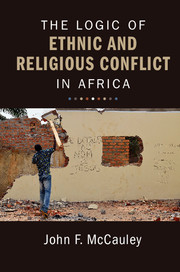Book contents
- The Logic of Ethnic and Religious Conflict in Africa
- The Logic of Ethnic and Religious Conflict in Africa
- Copyright page
- Dedication
- Contents
- Figures
- Tables
- Abbreviations
- Preface and Acknowledgments
- Part I
- Part II
- 5 A Theory of Identities, Political Choice, and Conflict
- 6 Ethnic and Religious Identity in Côte d’Ivoire’s Conflict
- 7 Ethnicity and Religion in Sudan’s Civil Wars
- 8 Ethnicity and Religion in Nigeria’s Biafran War
- 9 Conclusion
- Appendixes
- Bibliography
- Index
9 - Conclusion
from Part II
Published online by Cambridge University Press: 09 May 2017
- The Logic of Ethnic and Religious Conflict in Africa
- The Logic of Ethnic and Religious Conflict in Africa
- Copyright page
- Dedication
- Contents
- Figures
- Tables
- Abbreviations
- Preface and Acknowledgments
- Part I
- Part II
- 5 A Theory of Identities, Political Choice, and Conflict
- 6 Ethnic and Religious Identity in Côte d’Ivoire’s Conflict
- 7 Ethnicity and Religion in Sudan’s Civil Wars
- 8 Ethnicity and Religion in Nigeria’s Biafran War
- 9 Conclusion
- Appendixes
- Bibliography
- Index
Summary
- Type
- Chapter
- Information
- The Logic of Ethnic and Religious Conflict in Africa , pp. 171 - 182Publisher: Cambridge University PressPrint publication year: 2017



